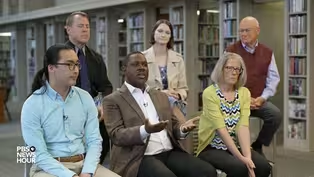
Supreme Court limits how prisoners can challenge convictions
Clip: 7/5/2023 | 5m 30sVideo has Closed Captions
Supreme Court decision limits how prisoners can challenge their convictions
Amid the flurry of Supreme Court rulings on affirmative action, student loans and election law, the justices also handed down a decision on what seemed to be a rather technical question of law. It has big consequences for federal prisoners trying to challenge their convictions. John Yang discussed the case with Daniel Medwed, author of “Barred: Why the Innocent Can't Get Out of Prison.”
Problems playing video? | Closed Captioning Feedback
Problems playing video? | Closed Captioning Feedback
Major corporate funding for the PBS News Hour is provided by BDO, BNSF, Consumer Cellular, American Cruise Lines, and Raymond James. Funding for the PBS NewsHour Weekend is provided by...

Supreme Court limits how prisoners can challenge convictions
Clip: 7/5/2023 | 5m 30sVideo has Closed Captions
Amid the flurry of Supreme Court rulings on affirmative action, student loans and election law, the justices also handed down a decision on what seemed to be a rather technical question of law. It has big consequences for federal prisoners trying to challenge their convictions. John Yang discussed the case with Daniel Medwed, author of “Barred: Why the Innocent Can't Get Out of Prison.”
Problems playing video? | Closed Captioning Feedback
How to Watch PBS News Hour
PBS News Hour is available to stream on pbs.org and the free PBS App, available on iPhone, Apple TV, Android TV, Android smartphones, Amazon Fire TV, Amazon Fire Tablet, Roku, Samsung Smart TV, and Vizio.
Providing Support for PBS.org
Learn Moreabout PBS online sponsorshipAMNA NAWAZ: Amid the flurry of Supreme Court rulings late last month, the justices also handed down a decision on what seemed to be a rather technical question of law around federal habeas petitions, a fundamental right that protects against unlawful and indefinite imprisonment.
But, as John Yang reports, the decision has big consequences for federal prisoners trying to challenge their convictions.
JOHN YANG: Amna, the case involved a man who was convicted in 2000 of having guns, despite being a felon, a violation of federal law.
He was sentenced to more than 27 years in prison.
But, nearly two decades later, the Supreme Court changed the interpretation of the law used to convict him.
Under the new interpretation, he would be innocent.
And so, on those grounds, he went to court to have his conviction thrown out.
But in a 6-3 decision that fell along ideological lines, the court said he couldn't appeal because he'd already challenged his conviction once before.
Daniel Medwed is a professor at Northeastern University School of Law and the author of "Barred: Why the Innocent Can't Get Out of Prison."
Mr. Medwed, what does this do for people like Mr. Jones in this case, people like him who want to have their convictions reviewed?
DANIEL MEDWED, Northeastern University: I think, as Justice Jackson said in her dissent, in a sense, this slams the door on people trying to raise claims of legal innocence, that the evidence can prove their guilt beyond a reasonable doubt, after they have already filed one of their federal habeas petitions.
This relates to federal habeas corpus, which is one of the greatest, potentially greatest post-conviction remedies we have in our country.
But the Supreme Court has gradually whittled away at it as a tool for justice.
JOHN YANG: You mentioned Justice Jackson.
Another line in her dissent, she called tried to get a review, an appeal in the federal court aimless and chaotic exercise in futility, artificial barriers, arbitrary dead ends and traps for the unwary.
How did we get here?
DANIEL MEDWED: We got here over a series of twists and turns that were charted both by the Supreme Court and by Congress.
There was a 1993 case called Herrera v. Collins in which the Supreme Court said a claim of actual innocence by itself won't be recognized in one of these federal habeas corpus petitions.
And then, in 1996, Congress changed the law governing these federal habeas corpus procedures to make it very, very difficult to get into court.
There are strict statutes of limitations, restrictions on when you can file second or successive habeas petitions and other onerous procedural barriers.
So, I think this case, Jones v. Hendrix, is part of a multidecade train -- trend toward narrowing the federal habeas corpus remedy.
JOHN YANG: Is this something that the court is doing, or were the law is written to be hard for prisoners to get out of prison?
DANIEL MEDWED: So, if I were to allocate blame, I think it could go both to the court and the Congress, but, mainly, it lies at the feat of Congress.
JOHN YANG: They also in this decision -- actually, Clarence Thomas, who wrote the majority decision, said that the Congress has chosen finality over error correction.
What do you think of that?
DANIEL MEDWED: Well, I think it's an interesting issue.
So, on the one hand, finality is often highlighted as a variable or as a factor in favor of curtailing post-conviction remedies.
The idea is that, at some point, litigation should be final, or else victims won't have closure, and the litigation system won't have the capacity to absorb new cases.
But, on the other hand, I think that finality is often a fallacy.
What good is finality if, in fact, there is an underlying question of legal or factual innocence?
That is a problem.
I think accuracy is more important than finality.
And, sometimes, that means we should take a closer look, maybe a second look, at a meritorious claim.
JOHN YANG: Talk about the people who are wrongly convicted, who have innocent -- are innocent and can prove their innocence.
I think we all have the image for movies or television that someone rushes into the courtroom and says, "This man is innocent," and he is released.
But why is it so hard to correct a wrongful conviction?
DANIEL MEDWED: A wonderful and important question.
So, a couple of thoughts.
First of all, there's a misimpression that biological evidence, scientific evidence, is available in all these cases, and if you can just find it and test it after your conviction, voila, the prison gates will open.
That's not true.
Biological evidence suitable, for instance, for DNA testing is estimated to be available in only 10 to 20 percent of criminal cases to begin with, and that assumes that it's retrieved at the crime scene and adequately stored.
Second, even with out scientific evidence, it's incredibly hard to reverse a conviction, because, after a conviction, the presumption of innocence disappears, a presumption of guilt takes hold, and all of the procedures are stacked in favor of reinforcing and supporting that finding of guilt.
It is so hard not only to find new evidence, but, once you found it, you have to overcome an array of procedural obstacles just to get into court.
JOHN YANG: Daniel Medwed from the Northeastern University School of Law, thank you very much.
DANIEL MEDWED: Thank you so much, John.
Israeli operation leaves Palestinian camp in shambles
Video has Closed Captions
Clip: 7/5/2023 | 5m 12s | Israeli anti-militant operation in West Bank leaves Palestinian refugee camp in shambles (5m 12s)
Judge limits government contact with social media companies
Video has Closed Captions
Clip: 7/5/2023 | 11m 22s | Judge limits government's contact with social media companies after GOP states sue (11m 22s)
Ohio voters work to bridge the widening partisan divide
Video has Closed Captions
Clip: 7/5/2023 | 13m 29s | How a group of Ohio voters are working to bridge the widening partisan divide (13m 29s)
Philadelphia DA on what can be done to curb gun violence
Video has Closed Captions
Clip: 7/5/2023 | 6m 11s | Philadelphia district attorney discusses what needs to be done to curb gun violence (6m 11s)
Skyrocketing cost of living threatens Austin's music scene
Video has Closed Captions
Clip: 7/5/2023 | 7m 1s | Skyrocketing cost of living threatens Austin's status as live music capital of the world (7m 1s)
Providing Support for PBS.org
Learn Moreabout PBS online sponsorship
- News and Public Affairs

FRONTLINE is investigative journalism that questions, explains and changes our world.

- News and Public Affairs

Amanpour and Company features conversations with leaders and decision makers.












Support for PBS provided by:
Major corporate funding for the PBS News Hour is provided by BDO, BNSF, Consumer Cellular, American Cruise Lines, and Raymond James. Funding for the PBS NewsHour Weekend is provided by...




